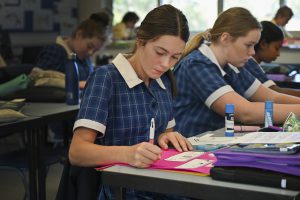
by Ms Kath D’Elia, Director of Learning Senior Years
Do you know what changes occur to the neurons in your brain when you learn something new? Are you able to remember new information easily, or do you have trouble recalling concepts you have just learned? Do you think people are born to be good or bad at school with no ability to change their achievement levels?
In 2020, for the first time, GVGS was invited to take part in an exciting partnership with Independent Schools Victoria (ISV) called The Cognizance Project.
Facilitated by renowned neuropsychologist Dr Jared Cooney Horvath, The Cognizance Project provides students with the tools to take charge of their own learning. Students learn how the brain works, what rules guide its function and how to leverage these rules in study and life. Cognizance also allows teachers to improve their ability to coach students on metacognition.
Beginning with an introductory session for teachers in Term 1, a key feature of the project is helping teachers see how they can help students develop metacognitive skills that will last them throughout their entire schooling lives and beyond.
After that, Dr Jared was set to travel to Shepparton to run in-school sessions with all of our Year 9 students learning about how the brain works, how it can be utilised to maximise academic success, and how knowledge about the processes involved in learning can help us to learn more efficiently and effectively.
These sessions ended up being held virtually over Zoom sessions due to the Coronavirus restrictions. It was a testament to the quality of the program that despite the sessions being held online most students reported very high levels of engagement and interest in the program.
“I just wanted to let you know that I found the program really fascinating and enjoyable! I’d definitely be keen to see Dr Jared again next year, as it was super valuable, thought-provoking and interesting, and one of the highlights of online learning for me. Thanks for organising it!” said Year 9 student Imogen Templeton when asked about the effectiveness of the program.
Another Year 9 student, Millar Carter, commented, “I think the Program was really worth it and I learnt heaps from this experience, I think it would be fantastic for Dr Jared to come to school to speak to us again next year.”
Students explored concepts related to the brain and memory such as what happens neurologically when an error is made. When students make an error in thinking and this is pointed out through feedback or becomes clear through subsequent learning, the brain essentially has two choices to make – we can engage with the error or we can avoid it. Although we generally find it more comfortable to go on ignoring the error – and thus believing incorrect information – if we actively engage with it we are very likely to remember the new information correctly. Knowing this can help students to make an active decision to engage with errors when they get the ‘funny feeling’ that accompanies realising they have made an error.
Throughout the program, students submitted ongoing reflections about what they were learning and how this applied to them. Some of their comments are included below.
“I have been trying out the recall and feedback activities suggested by Dr Jared. I get my parents to ask me questions about school and I try to remember as much as I can without looking in my textbook. I’ve only been doing this since our last session two weeks ago but I can already see it is making a difference”.
“It was nice to hear Dr Jared talking about Narratives and Stories – how humans think in stories. Whenever I hear a story, I find it easy to remember, but I find slabs of information from textbooks hard to recall. I didn’t realise this was the same for everyone, so knowing that turning information into stories will help me remember and there is a reason for it, is good to know”.
This information was gathered from anonymous student feedback.